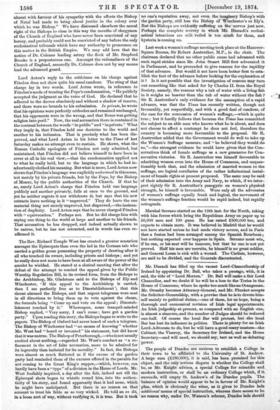Lord Acton's reply to the criticisms on his charge against
Fenelon does not show quite his usual candour. The sting of that charge lay in two words. Lord Acton wrote, in reference to Fenelon's mode of treating the Pope's condemnation, "He publicly accepted the judgment as the voice of God. He declared that he adhered to the decree absolutely and without a shadow of reserve, and there were no bounds to his submission. in private, he wrote that his opinions were perfectly orthodox and remained unchanged, that his opponents were in the wrong, and that Rome was getting religion into peril." Now, the real accusation there is contained in the contrast between the words "in public " and "in private." What they imply is, that Fend= held one doctrine to the world and another to his intimates. That is precisely what has been dis- proved, and what Lord Acton in his letter to the Times of last Saturday makes no attempt even to sustain. He shows, what the Roman Catholic apologists of Fdnelon not only admitted, but maintained, that Fenelon did not believe himself to have been in error at all in his real view,—that the condemnation applied not to what he really held, but to the language in which he had in- advertently clothed his meaning. But what is more, Lord Acton now shows that Fenelon's language was explicitly understood in this sense, not merely by his private friends, but by the Pope, by the Biahop of Meaux, by the -public authorities of the Church. If that be so, surely Lord Acton's charge that Fenelon held one language publicly and another privately, falls at once to the ground, and yet he neither regrets it nor withdraws -it, but says that his new extracts leave nothing in it "unproved." They do leave the one material thing not merely unproved, but disproved,—the insinua- tion of duplicity. Lord Acton says that he never charged Fbielon with " equivocation." Perhaps not. But he did charge him with saying one thing to the world at large and another to his friends. That accusation he has dropped, and indeed actually shown to be untrue, but he has not retracted, and in words has even re- affirmed it.






































 Previous page
Previous page